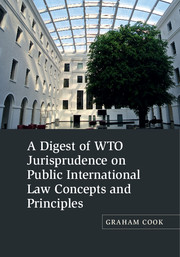Book contents
- Frontmatter
- Contents
- Foreword
- Disclaimer
- Acknowledgments
- Preface
- Editorial conventions
- Glossary of commonly used terms
- Table of GATT/WTO cases
- 1 Admissibility and jurisdiction
- 2 Attribution of conduct
- 3 Breach of an obligation
- 4 Conflicts between treaties
- 5 Countermeasures
- 6 Due process
- 7 Evidence before international tribunals
- 8 Good faith
- 9 Judicial economy
- 10 Municipal law
- 11 Non-retroactivity
- 12 Reasonableness
- 13 Sources of international law
- 14 Sovereignty
- 15 Treaty interpretation
- 16 Words and phrases considered
- Index
8 - Good faith
Published online by Cambridge University Press: 05 July 2015
- Frontmatter
- Contents
- Foreword
- Disclaimer
- Acknowledgments
- Preface
- Editorial conventions
- Glossary of commonly used terms
- Table of GATT/WTO cases
- 1 Admissibility and jurisdiction
- 2 Attribution of conduct
- 3 Breach of an obligation
- 4 Conflicts between treaties
- 5 Countermeasures
- 6 Due process
- 7 Evidence before international tribunals
- 8 Good faith
- 9 Judicial economy
- 10 Municipal law
- 11 Non-retroactivity
- 12 Reasonableness
- 13 Sources of international law
- 14 Sovereignty
- 15 Treaty interpretation
- 16 Words and phrases considered
- Index
Summary
Introduction
This chapter reviews WTO jurisprudence on good faith, a fundamental concept that permeates the law of treaties and international dispute settlement. This concept is ‘ambiguous if not amorphous or elusive’. In General Principles of Law as Applied by International Courts and Tribunals, Cheng wrote:
What exactly this principle implies is perhaps difficult to define. As an English judge once said, such rudimentary terms applicable to human conduct as ‘Good Faith’, ‘Honesty’, or ‘Malice’ elude a priori definition. ‘They can be illustrated but not defined.’ [This part] will be an attempt to illustrate, by means of international judicial decisions, the application of this essential principle of law in the international legal order.
WTO adjudicators have been confronted with various arguments and issues relating to ‘good faith’, and have generated a substantial body of related jurisprudence as a result. This chapter reviews statements by WTO adjudicators of wider applicability concerning: (i) good faith pending the entry into force of treaties; (ii) good faith and the performance and interpretation of treaties; and (iii) good faith in international dispute settlement.
Good faith pending the entry into force of treaties
Article 18 of the Vienna Convention, entitled ‘Obligation not to defeat the object and purpose of a treaty prior to its entry into force’, provides that a State ‘is obliged to refrain from acts which would defeat the object and purpose of a treaty’ pending its entry into force. Several panels have expressed the view that Article 18 summarizes the concept of good faith, and several panels have examined the consistency of certain actions with the obligation in Article 18.
In US – Shrimp, the Panel stated that it understood prior statements by the Appellate Body regarding the interpretation of the general exceptions in Article XX of the GATT to be an application of the international law principle according to which international agreements must be applied in good faith, in light of the pacta sunt servanda principle in Article 26 of the Vienna Convention.
- Type
- Chapter
- Information
- Publisher: Cambridge University PressPrint publication year: 2015

